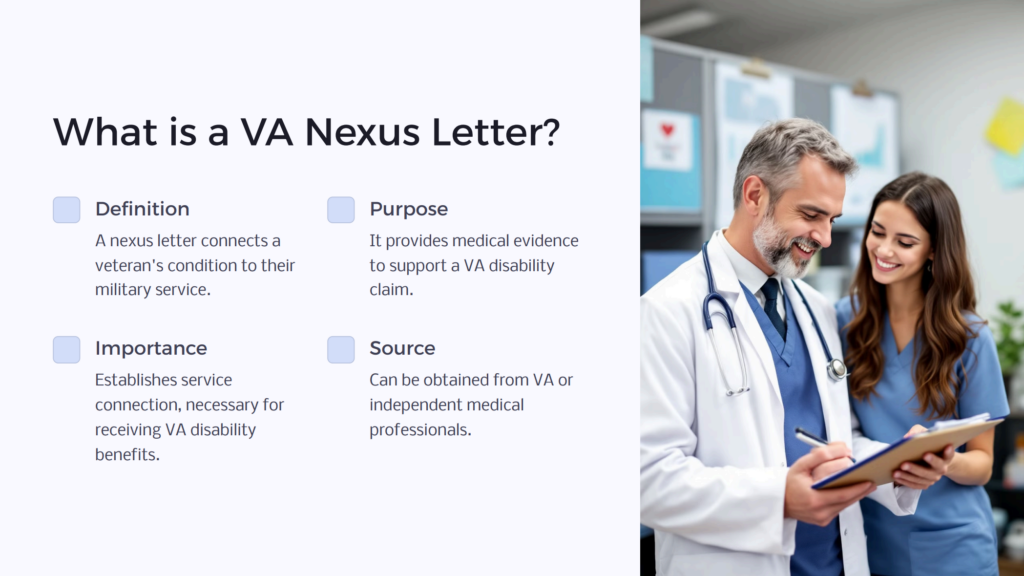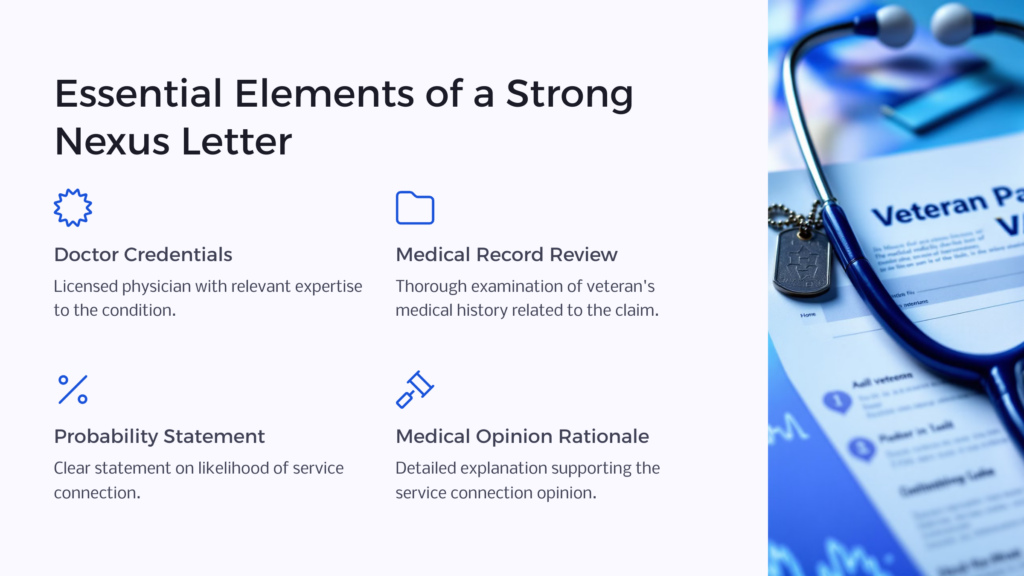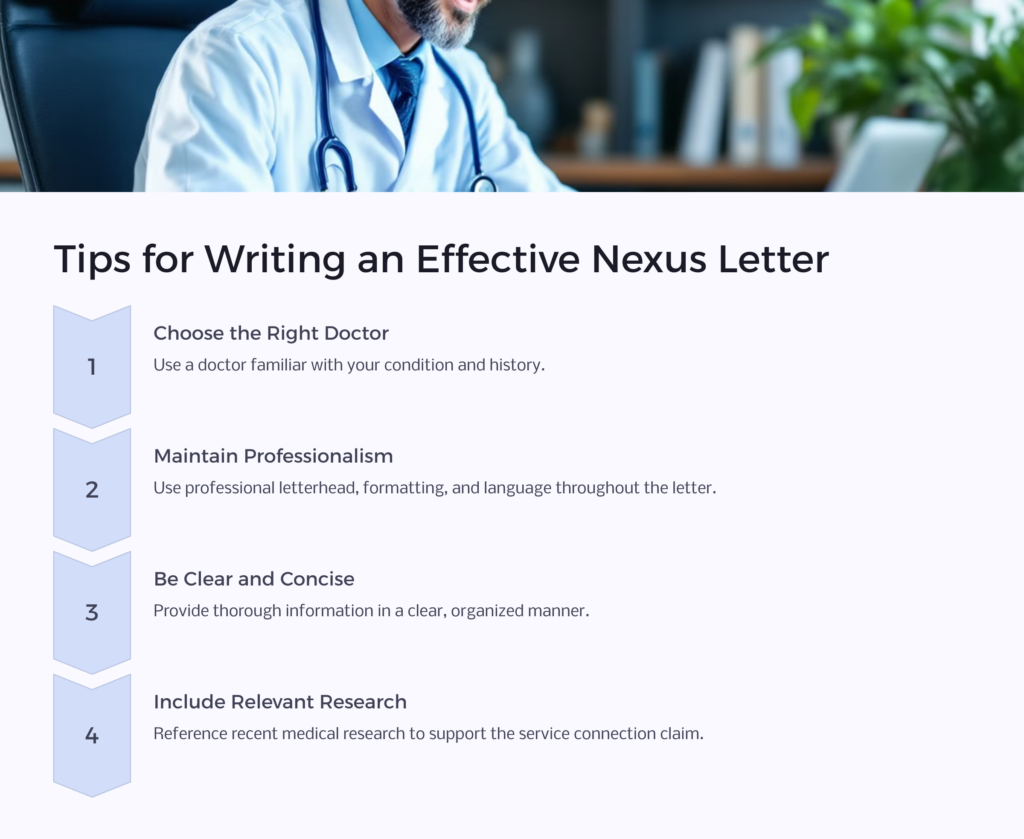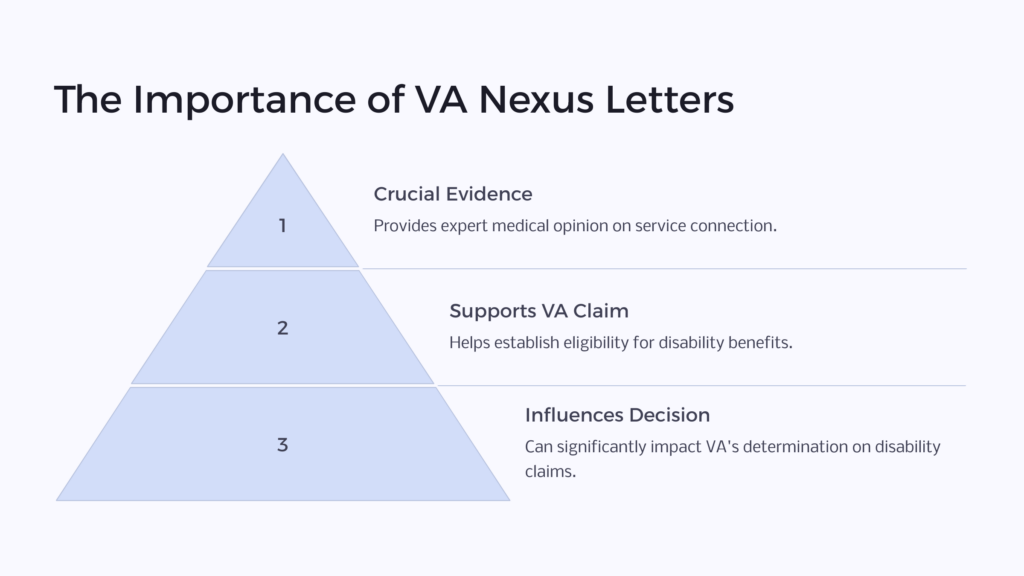When you apply for VA disability benefits, the Department of Veterans Affairs (VA) may require you to obtain a nexus letter. In the letter, a medical expert provides evidence and opinion that connects your condition or disability to your military service. It’s important to find a doctor willing to provide a well-thought-out medical opinion to assist with your VA disability claim.
4 Essential Elements of a Strong Nexus Letter
- Doctor Credentials
- Medical Record Review Related to Claim
- State the Probability of Service Connection
- Rationale of Medical Opinion
Veterans Affairs provides monthly compensation to eligible disabled veterans. After the VA has determined that a condition or disability is connected to military service, the VA will assign a disability rating based on the severity of the disability. This rating affects how much disability compensation the veteran may receive monthly.
Many things go into an application for disability benefits. For example, veterans may be required to attend medical appointments to diagnose or further explain a condition to the VA. In most cases, a nexus letter is a necessary part of the application that gathers an independent medical opinion from a medical professional who understands your case.
What Is a Nexus Letter?

A nexus connects two related things. In terms of a service connected condition, a VA disability nexus letter attempts to give a veteran the benefit of the doubt that their condition or disability is service-connected.
Why is a service connection important for veterans with a VA claim for disability? The service connection states that the condition stemmed from or was worsened by the veteran’s service time. This connection is necessary to receive VA disability benefits, which compensate veterans who were injured or became ill during their military service.
A strong nexus letter can give medical insight into the veteran’s condition and how it stemmed from their service, allowing the veteran to claim veterans benefits for their disability. This letter will also lead to a VA disability rating, which determines the degree of disability for veterans benefits purposes.
Nexus letters must contain specific information and medical evidence about the veteran’s medical condition, such as post traumatic stress disorder (PTSD), obstructive sleep apnea, or symptoms relating to Agent Orange. Upon receiving a nexus letter as part of a veteran’s disability claim, the VA will review it to determine whether a service connection exists.
Unlike a Compensation and Pension (C&P) exam, which the VA may require a veteran to attend before getting a rating and disability benefit determination, the veteran does not need to use a VA doctor to get a medical nexus letter. You can leave a CP exam with a nexus letter, but you may also go to another doctor to provide it. This allows the veteran to obtain an independent medical opinion from a medical professional that understands the condition and knows the veteran’s history.
4 Essential Elements of a Strong Nexus Letter

Veterans must have a nexus letter written by a medical professional for the VA to determine a service connection between their active duty and service and their condition. Each nexus letter should include the following four components for the VA to consider it complete.
1. Doctor Credentials
The nexus letter should begin by providing the physician’s credentials. The medical professional writing the letter must be licensed and be able to prove that they can legally practice medicine.
The doctor should also prove that they have the proper credentials to understand and provide a nexus opinion regarding the veteran’s current medical condition. For instance, a physical therapist can discuss issues relating to leg pain and physical therapy progress. However, they should not be able to give a medical opinion on a veteran’s lung condition.
A physician can outline some of their credentials in the letter to provide an overview of their expertise. It’s common for medical experts to also attach copies of their credentials, such as a degree or medical license, to the letter for the VA to review.
2. Review of Medical Records Related to Claim
This section is typically the bulk of the nexus letter. It begins with an overview of the veteran’s medical records as they relate to the claim. For example, the medical expert may provide a brief medical history of the veteran’s heart problems, which is the basis for their VA disability claim.
The doctor will discuss the patient’s records and state how the current disability affects the patient in this overview. Information about symptoms, symptom severity, testing, and treatment may be included in this letter portion.
The physician can also talk about specific documents in the patient’s medical history related to the claim. They may also discuss how long they’ve treated the patient and why the patient is being treated.
Ultimately, it’s the doctor’s responsibility to explain that they have thoroughly reviewed the patient’s medical history and VA documents related to the claim before writing a nexus letter and giving the doctor’s opinion.
3. State the Probability of Service Connection
A good nexus letter states a degree of likelihood that the condition has a service connection.
Medical professionals typically state degrees of likelihood as one of the following:
- Not likely
- At least as likely as not
- More than likely
- Highly likely
At the very least, a nexus letter should include at least as likely as not to establish a potential service connection for compensation. This probability should also explain why the medical professional believes that a veteran’s condition is related to their service.
4. Rationale of Medical Opinion
The good news about a nexus letter is that the medical expert does not need to have 100% medical certainty that a condition relates to a veteran’s service. However, there does need to be an opinion that there could be a service connected condition. A doctor should clearly state why their independent medical opinion points this way based on their medical expertise.
Veterans should ensure that their doctor uses strong evidence from their medical history and everything they understand about the condition to support their opinion.
The doctor should use the correct timeline of events to describe how a veteran’s current disability or secondary condition could have started or been made worse by active duty and service and how their symptoms have stayed the same or worsened over time.
This element can also include ties back to strong evidence from medical research that the doctor can use to support their opinion of your condition and symptoms.
How To Write a Nexus Letter

A medical professional may choose to write a nexus letter in different ways to help a veteran receive disability benefits. There aren’t steadfast rules for a nexus letter other than ensuring that basic components are included. Still, it’s a good idea to ensure that the doctor follows the tips below to create a professional and detailed nexus letter.
Use a Doctor Who Has Diagnosed and Treated You Before
It’s a good idea to request a doctor who has already examined you and treated you previously, especially for the condition for which you’re seeking VA benefits. You’ve probably had a VA doctor oversee your condition, but you are entitled to a private doctor as well. This doctor should know your medical history, understand your current medical condition, and be able to explain how this condition affects you daily.
Find a Doctor with Expertise in Your Condition
Not only should the doctor be familiar with you and your condition, but they also should have plenty of expertise in diagnosing and treating that condition. The VA will want to know from a medical expert more about your condition and how it affects you, so their credentials should align with your condition and medical treatment.
For instance, a pulmonologist should be able to speak on your history of asthma accurately. The VA would rather see as much expert evidence as possible rather than lay evidence.
Keep It Professional
Most importantly, your nexus letter should look professional. The doctor writing the medical nexus letter should appear as professional as possible, so a good nexus letter will exude professionalism from the start. The letter should use an easy-to-read font, have organized margins and spacing, and appear on professional letterhead with the doctor’s or office’s information. Be sure to proofread and edit for errors in grammar and spelling.
Keep Your Medical History Up to Date
During your most recent appointment before your doctor writes a nexus opinion and letter, make sure you update your medical history. Ask the office for the most recent copies of your medical file to ensure its accuracy, and let your doctor know of any changes that need to be made. Your doctor will write about your medical history in the nexus letter, so it must be correct.
Be Clear and Concise
There’s no need for a medical expert to write pages upon pages of lay evidence or medical history in your nexus letter. Instead, they should be thorough and detailed but in a concise manner. The VA has numerous VA disability claims to sift through every day, so including an organized and detailed nexus letter with all necessary information is the best way to get a quicker determination.
Reference Relevant Medical Research

Your medical expert could boost the trust factor of their included information by referencing relevant medical research in the nexus letter. Your doctor’s independent medical opinion will likely be more credible if they can back up their opinion using recent medical research that proves the connection between symptoms and a condition, like obstructive sleep apnea and cardiovascular issues.
Start with a Sample Nexus Letter
Not all doctors have written nexus letters for patients. A sample nexus letter can help them include all the basic information and organize their letter thoughtfully. You can find several sample nexus letters online to assist your doctor.
The Importance of the VA Nexus Letter

A nexus letter provides a medical record review, medical evidence, and an expert medical opinion to explain whether a veteran’s injury, illness, or disability is potentially connected to their service. The VA expects these letters to be both thorough and concise, detailing solid, ample evidence of a service connection to assist in determining whether a veteran is eligible for disability benefits.
A nexus letter does not guarantee disability compensation from the VA, even if it’s a good nexus letter that includes all components. The VA also considers other information, including the C&P exam results and additional medical information the veteran provides with their application for VA benefits. Still, the nexus letter is an important piece of the determination process, and getting it right the first time can assist the veteran’s case.
If you have a case with benefits on the line, take our free assessment and we’ll help you each step of the way.
Related Articles
© 2026 Benefits.com All Rights Reserved
















 Benefits.com Advisors
Benefits.com Advisors


